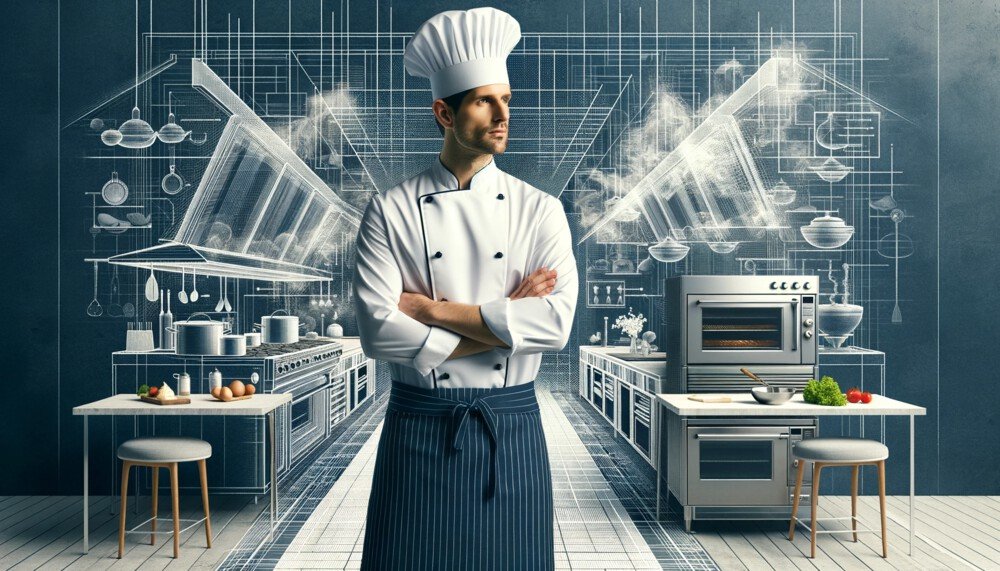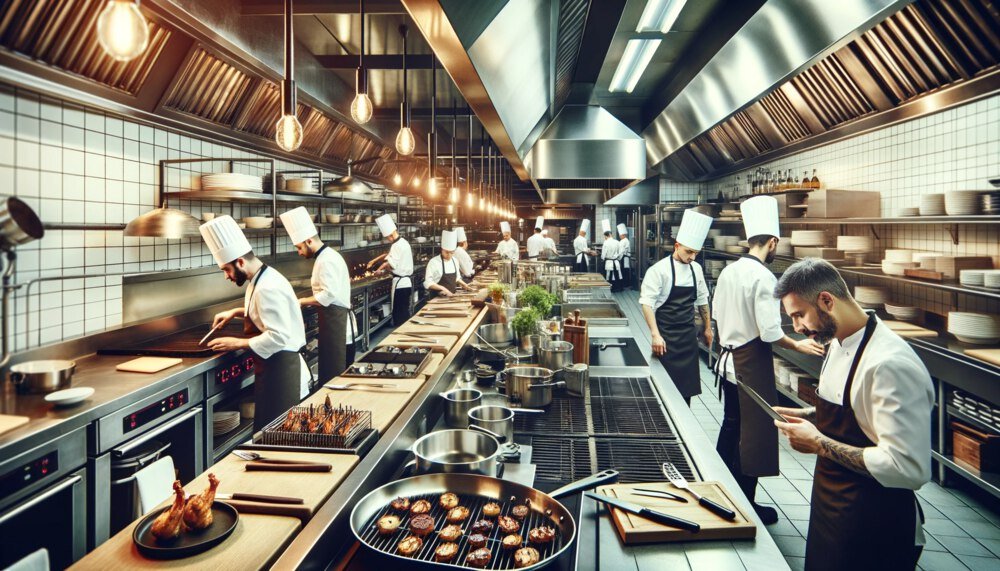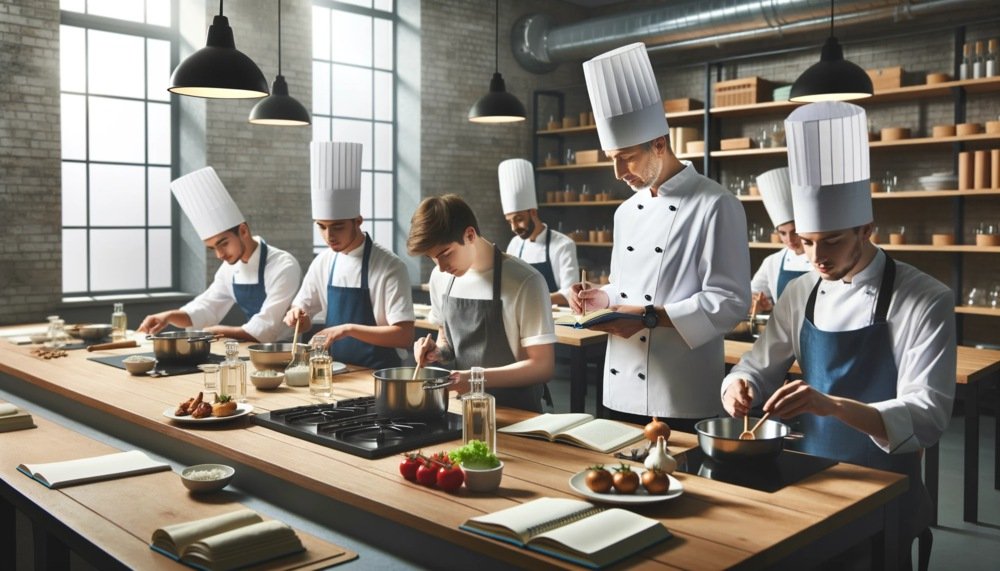- Introduction
- Chef de Cuisine Defined
- Roles and Responsibilities of Chefs
- Chef’s Restaurant in Buffalo: A Century of Culinary Tradition
- The Work Environment for Chefs and Head Cooks
- Education and Training for Aspiring Chefs
- Career Outlook for Chefs and Head Cooks
- Understanding Chef Titles and the Brigade System
- Health and Safety in the Kitchen
- Compensation Patterns for Culinary Professionals
- Conclusion
- FAQs
- Frequently Linked Pages
Introduction
In the vibrant world of gastronomy, head cooks hold an indispensable role. They create delicious meals and lead a team of workers in the kitchen. Head cooks are essential in the culinary industry and have one of the most important occupations. With their unique blend of skill, creativity, and passion, executive chefs, sous chefs, and head cooks are responsible for crafting delectable and visually stunning dishes that tantalize our taste buds. These culinary maestros are considered the best new chefs in the industry. From the meticulous labor of head cooks to the artful presentation by workers, chefs pour their heart and soul into every plate they create.

Executive chefs, sous chefs, and head cooks are known for their expertise in cooking. However, their skills also extend to menu planning, ingredient sourcing, and managing kitchen operations. These professionals are considered some of the best new chefs in the industry. Whether working in high-end establishments or serving their local communities, head cooks bring a wealth of experience and knowledge to their craft. These workers are vital to the occupational employment in the culinary industry. Many sous chefs and head cooks have honed their skills through years of hands-on work in various culinary occupations before earning the prestigious title of “chef.” Some of the best new chefs have pursued formal education and certification to further enhance their abilities.
Chef de Cuisine Defined
Highest-ranking chef in a kitchen
The chef de cuisine, also known as the head cook, holds the esteemed position of being the highest-ranking chef in a kitchen. This occupation is important for workers in the culinary industry and offers employment opportunities. Head cooks are the top workers in the culinary hierarchy, overseeing and directing all aspects of food preparation. They are essential to the employment of various occupations within the culinary industry. With their expertise and experience, head cooks ensure that every dish leaving the kitchen is exceptional. These workers are crucial for the employment of occupations in the culinary industry.
Overseeing all aspects of food preparation
As the head chef, the chef de cuisine has the critical responsibility of overseeing all aspects of food preparation for cooks and other kitchen workers employed in the culinary industry. From recipe creation to ingredient selection, head cooks meticulously plan and execute each step to perfection, ensuring the employment of workers and keeping a tab on their performance. Head cooks are workers who have a keen eye for detail and an innate ability to create harmonious flavors on every plate. This occupation offers great employment opportunities.
Ensuring quality control
Quality control is paramount in any professional kitchen, and the head cooks, who are responsible for overseeing the workers, take this responsibility seriously. The chef de cuisine is a key occupation in the culinary industry, ensuring the employment of skilled workers and maintaining high standards. Head cooks, as workers in the occupation, are vigilant about maintaining high standards throughout every stage of cooking, ensuring that each dish meets or exceeds customer expectations. This dedication to quality is why head cooks are sought after for employment. From taste to presentation, head cooks leave no room for compromise. These workers in the occupation of head cooks are dedicated to their employment.
Menu planning and innovation
One of the primary roles of head cooks, also known as chefs de cuisine, is menu planning. This occupation involves the employment of workers in the culinary industry. Head cooks are the workers in the culinary occupation who curate diverse menus that cater to different tastes while keeping up with current culinary trends. Their employment involves creating and preparing dishes for various customers. By incorporating innovative techniques and ingredients, head cooks bring excitement and freshness to each dish, constantly pushing boundaries in gastronomy. This occupation offers rewarding employment opportunities.
Managing kitchen staff
A successful kitchen requires efficient teamwork, and it is the duty of head cooks to manage and lead their staff effectively. Employment is crucial in ensuring a well-functioning kitchen. From hiring and training new head cooks to delegating tasks during service hours, they ensure that everyone works cohesively towards a common goal – delivering exceptional dining experiences. Employment of head cooks is crucial for the successful operation of a restaurant.
The chef de cuisine serves as a mentor figure for aspiring head cooks within their team, providing guidance and support in their employment journey. Head cooks provide guidance and support in employment while nurturing talent by encouraging creativity and growth in others.
Roles and Responsibilities of Chefs
Being a chef is no piece of cake! Employment as head cooks requires a unique set of skills, passion for food, and the ability to handle the heat in the kitchen.

Recipe Creation and Menu Development
Head cooks, also known as chefs, are the masterminds behind creating delicious recipes that tantalize our taste buds. Head cooks have an innate talent for combining flavors, textures, and ingredients to create culinary masterpieces. From appetizers to desserts, head cooks meticulously craft recipes that showcase their creativity and expertise.
In addition to recipe creation, head cooks also play a crucial role in menu development. Head cooks carefully curate menus that cater to different tastes and dietary preferences while ensuring a harmonious balance of flavors across various dishes. Head cooks, also known as chefs, consider factors such as seasonality, availability of ingredients, and customer preferences when designing menus that leave diners craving for more.
Supervising Kitchen Operations
A chef’s responsibility extends beyond just cooking; they are also responsible for overseeing kitchen operations to maintain efficiency. Head cooks play a crucial role in maintaining efficiency and overseeing kitchen operations. They manage a team of cooks and kitchen staff, delegating tasks and ensuring smooth coordination among team members.
From organizing workstations to monitoring inventory levels, head cooks keep everything running like a well-oiled machine in the kitchen. Head cooks ensure that all necessary equipment is functioning properly and that ingredients are readily available for their tasks. By maintaining orderliness in the kitchen, head cooks create an environment where teamwork thrives and culinary creations come to life.
Ensuring Food Safety Standards
Food safety is paramount in any professional kitchen, and head cooks bear the responsibility of upholding these standards at all times. Head cooks possess extensive knowledge about proper food handling practices, storage techniques, temperature control measures, and are experts in these areas.
Head cooks and chefs implement rigorous hygiene protocols to prevent cross-contamination and maintain cleanliness throughout the kitchen. Head cooks conduct regular inspections to ensure compliance with health regulations while keeping meticulous records of food safety measures.
Furthermore, head cooks and chefs are well-versed in allergen management and dietary restrictions. The head cooks take utmost care to accommodate special dietary needs, ensuring that every guest, including those with specific dietary restrictions, can enjoy a safe and delicious dining experience.
Chef’s Restaurant in Buffalo: A Century of Culinary Tradition
A Historic Gem in Buffalo
Nestled in the heart of Buffalo, New York, Chef’s Restaurant is a culinary institution that has stood the test of time for over a century. With its team of experienced head cooks, this restaurant continues to thrive. This iconic restaurant, known for its talented head cooks, holds a special place in the hearts and taste buds of both locals and tourists alike.
A Taste of Tradition
When you step into Chef’s Restaurant, you are transported back to a bygone era. The warm and inviting atmosphere, coupled with the mouthwatering aroma of Italian cuisine, creates an unforgettable dining experience. With its rich history dating back to 1923, Chef’s has become synonymous with traditional Italian-American fare.
Authentic Italian Cuisine
At Chef’s Restaurant, you can expect nothing less than authentic Italian dishes made with love and passion. From classic pasta dishes like spaghetti and meatballs to delectable veal Parmesan, each dish is crafted with care using time-honored recipes passed down through generations.
Signature Dishes That Delight
One cannot talk about Chef’s without mentioning their famous Spaghetti Parmesan – a dish that has gained legendary status among food enthusiasts. Imagine perfectly cooked spaghetti topped with marinara sauce and melted cheese baked to golden perfection. It’s comfort food at its finest!
Another must-try dish is their mouthwatering Chicken French – tender chicken cutlets sautéed in a tangy lemon butter sauce. The flavors dance on your palate as you savor every bite.
An Enduring Legacy
What sets Chef’s apart from other restaurants is not just its delectable cuisine but also its rich history and commitment to quality. The Cichocki family has been at the helm since its inception, ensuring that every meal served reflects their dedication to maintaining the restaurant’s legacy.
Over the years, Chef’s has welcomed countless diners through its doors – from locals who have been coming for generations to famous celebrities and politicians. It has become a gathering place where memories are made and stories are shared.
A Community Staple
Chef’s Restaurant is more than just a place to enjoy a delicious meal; it is an integral part of the Buffalo community. The restaurant actively supports local charities, events, and organizations, giving back to the community that has supported them for so long.
The Work Environment for Chefs and Head Cooks

It can be described as fast-paced and high-pressure. The kitchen is often a bustling hub of activity, with orders flying in and out, and a constant need to ensure that dishes are prepared quickly and efficiently.
Long hours are a common aspect of this profession. Chefs and head cooks often work evenings, weekends, and even holidays. This is because restaurants are busiest during these times, and the demand for their culinary expertise is at its peak. It’s not uncommon for chefs to start early in the morning to prep ingredients or stay late into the night to oversee operations.
The working conditions may vary depending on the type of establishment where chefs operate. In upscale restaurants or fine dining establishments, executive chefs or head chefs typically lead a team of sous chefs, assistant chefs, line cooks, and other kitchen staff. They are responsible for creating menus, managing inventory, supervising food preparation techniques, ensuring quality control, and maintaining overall kitchen operations.
On the other hand, in smaller eateries or casual dining establishments, head cooks may have fewer assistants or work directly with line cooks to prepare meals. While they may not have as many administrative responsibilities as executive chefs do in larger establishments, they still play a crucial role in delivering delicious dishes to customers.
The work experience for chefs can be physically demanding as well. They spend long hours on their feet while cooking over hot stoves or grills. The kitchen environment can get quite hot due to multiple cooking appliances running simultaneously.
According to data from the Bureau of Labor Statistics’ Occupational Employment Statistics program (BLS OES), there were approximately 148,700 workers employed as chefs and head cooks in 2020. This number is projected to grow by 6 percent from 2019 to 2029—faster than the average growth rate for all occupations.
Understanding Chef Titles and the Brigade System
The brigade system is a hierarchical structure followed in professional kitchens. This system ensures that every position has its own set of responsibilities, contributing to the smooth functioning of the kitchen.

Different Chef Titles Signify Different Levels of Responsibility within the Brigade System
In the brigade system, there are various chef titles that indicate different levels of responsibility. These titles include sous chefs, executive chefs, head cooks, and best new chefs. Each title carries its own set of duties and roles within the culinary team.
In a professional kitchen, there are various chef titles that signify different levels of responsibility within the brigade system. The head chef, also known as the executive chef or chef de cuisine, is at the top of the hierarchy. They are responsible for overseeing all aspects of the kitchen operations, including menu planning, recipe development, and managing the kitchen staff.
Sous chefs are second in command and work closely with the head chef. They supervise other chefs and ensure that food is prepared according to high standards. Sous chefs often step in to lead when the head chef is unavailable.
Chefs de partie, also known as station chefs or line cooks, specialize in specific areas such as sautéing, grilling, or pastry. They have expertise in their respective stations and are responsible for preparing dishes assigned to them.
Commis chefs are entry-level positions where aspiring chefs start their culinary careers. They assist higher-ranking chefs with basic tasks such as food preparation and cleaning.
Each Position has Specific Duties that contribute to the smooth functioning of the kitchen
Within each chef title, there are specific duties that contribute to the smooth functioning of the kitchen. The head chef oversees menu planning and ensures that all dishes meet quality standards. They manage inventory, order supplies, and maintain cleanliness and hygiene in the kitchen.
Sous chefs assist with menu planning and supervise other members of the kitchen staff. They coordinate cooking times and ensure that dishes are prepared correctly before being sent out to customers.
Chefs de partie focus on their designated stations and ensure that all dishes from their station meet quality standards. They prepare ingredients, cook dishes according to recipes provided by the head chef, and maintain cleanliness in their stations.
Commis chefs assist higher-ranking chefs with various tasks, such as chopping vegetables, cleaning equipment, and organizing ingredients. They also have the opportunity to learn from experienced chefs and gain hands-on experience in different areas of the kitchen.
Education and Training for Aspiring Chefs
Culinary Education: A Path to Success
Aspiring chefs who dream of creating culinary masterpieces have various options. One popular route is pursuing formal culinary education at culinary schools or institutes. These institutions offer comprehensive programs in culinary arts, providing aspiring chefs with the knowledge and skills necessary to excel in the industry.
Culinary schools provide a structured curriculum that covers a wide range of topics, including food preparation techniques, kitchen management, nutrition, and menu planning. Students learn from experienced instructors who have worked in top restaurants around the world. This hands-on approach allows students to gain practical experience in a controlled environment.
Apprenticeships and Internships: Learning on the Job
While formal training is valuable, hands-on experience is equally essential for aspiring chefs. Many renowned chefs started their careers by working as apprentices or interns under established professionals. Apprenticeships offer aspiring chefs the opportunity to learn directly from experienced mentors while gaining practical skills in a real-world kitchen setting.
Apprenticeship programs typically last for several years, during which apprentices work alongside seasoned chefs, learning everything from basic knife skills to advanced cooking techniques. This immersive learning experience allows them to develop their culinary abilities while also building connections within the industry.
Internships are another avenue for aspiring chefs to gain practical experience. These shorter-term opportunities allow individuals to work in professional kitchens and observe how they operate on a day-to-day basis. Interns assist with food preparation, plating dishes, and other tasks under the guidance of experienced chefs.
Continuing Education: Staying Ahead of Trends
In an ever-evolving industry like gastronomy, it’s crucial for chefs to stay updated with new techniques and trends. Continuing education plays a vital role in ensuring that aspiring chefs remain competitive in the culinary world.
Chefs can pursue continuing education through workshops, seminars, and specialized courses offered by culinary associations, professional organizations, and even renowned chefs themselves. These opportunities allow chefs to expand their knowledge base, refine their skills, and stay abreast of emerging culinary trends.
Aspiring chefs can benefit from the wealth of resources available online. Websites, blogs, and video platforms such as the Food Network provide a plethora of educational content that aspiring chefs can access at their convenience. From recipe tutorials to cooking demonstrations by some of the best new chefs in the industry, these resources offer valuable insights and inspiration.
Career Outlook for Chefs and Head Cooks
The career outlook for chefs and head cooks looks promising, with steady growth projected in the coming years. Job opportunities in this field are expected to increase, providing aspiring chefs with a range of options to explore. Whether it’s working in restaurants, hotels, resorts, or other culinary establishments, there are ample possibilities for those passionate about food.
In the world of culinary arts, experience and proven skills play a crucial role in advancing to higher positions. While formal education is beneficial, it is often the hands-on experience that sets professionals apart. Aspiring chefs can gain valuable knowledge by working their way up from entry-level positions and learning from experienced mentors along the way.
One of the key factors contributing to the growth of job opportunities for chefs is the ever-evolving food industry. With an increasing demand for unique dining experiences and diverse cuisines, restaurants and hospitality establishments are constantly seeking talented individuals who can bring innovation to their menus. This presents an exciting opportunity for chefs to showcase their creativity and culinary expertise.
Apart from traditional restaurant settings, there are also emerging avenues where chefs can thrive. The rise of food delivery services has created a demand for skilled chefs who can create delectable meals that travel well. Private catering services have gained popularity among individuals hosting events such as weddings or corporate gatherings. These alternative career paths provide flexibility and allow chefs to explore different aspects of their craft.
It’s important to note that while job opportunities may be abundant, competition within the industry remains fierce. Chefs must continuously refine their skills and stay updated on current culinary trends to stay ahead of the curve. Building a strong professional network through industry events or competitions can also open doors to new opportunities.
Furthermore, employment projections indicate that as more people choose dining out over cooking at home, there will be a sustained need for skilled chefs and head cooks across various sectors of the food industry. This includes not only high-end restaurants but also casual dining establishments, hotels, resorts, cruise ships, and healthcare facilities. The demand for chefs who can cater to specific dietary preferences or restrictions, such as vegan or gluten-free cuisine, is also on the rise.
Health and Safety in the Kitchen
Ensuring health and safety in the kitchen is of utmost importance for chefs. They must adhere to strict regulations to maintain a safe working environment. Let’s dive into some key aspects that chefs need to consider.
Proper Food Handling, Storage, and Sanitation Practices
One of the fundamental aspects of maintaining a safe kitchen is proper food handling. Chefs must follow hygiene practices while preparing meals. This includes washing hands thoroughly before handling any food, using separate cutting boards for different types of ingredients (such as raw meat and vegetables), and avoiding cross-contamination.
Moreover, chefs should pay close attention to food storage. Perishable items like meat, dairy products, and cooked dishes must be stored at appropriate temperatures to prevent bacterial growth. Refrigerators should be regularly cleaned and maintained to ensure food stays fresh.
Sanitation practices are also crucial in preventing foodborne illnesses. Chefs should regularly sanitize surfaces, utensils, and equipment used during cooking. This helps eliminate any potential bacteria or contaminants that could compromise the safety of the prepared dishes.
Regular Maintenance of Equipment
Maintaining kitchen equipment is essential for both efficiency and safety reasons. Chefs should conduct regular inspections to ensure all appliances are functioning properly. Faulty equipment can pose serious hazards such as electrical shocks or fires.
In addition to inspections, chefs need to clean their equipment regularly. Grease buildup on stovetops or ovens can ignite easily if not addressed promptly. By keeping their equipment clean and well-maintained, chefs reduce the risk of accidents occurring during cooking.
Fire Safety Measures
Fire safety is a critical aspect of maintaining a safe kitchen environment. Chefs should familiarize themselves with fire prevention techniques and have fire extinguishers readily available in case of emergencies.
To prevent fires from starting in the first place, chefs should take precautions such as monitoring oil temperature while frying and keeping flammable materials away from heat sources. It’s also important to have clear evacuation plans and ensure that all staff members are aware of them.
Compensation Patterns for Culinary Professionals
One of the most pressing questions is often about compensation. How much do chefs actually make? Well, the answer isn’t as straightforward as you might think. The compensation for chefs can vary significantly based on various factors such as experience, location, and establishment type.
Varying Salary Ranges
Chefs occupy different positions within the culinary world, each with its own salary range. For instance, an executive chef who oversees the entire kitchen operation tends to earn a higher salary compared to a line cook or a pastry chef. According to wage statistics, the median wage for chefs and head cooks in 2020 was $51,530 per year or $24.77 per hour.
Factors Affecting Compensation
Experience plays a crucial role in determining a chef’s pay scale. Those with several years of experience under their belt often command higher salaries due to their expertise and proven track record. Location also influences compensation patterns. Chefs working in major metropolitan areas where the cost of living is higher may receive higher wages compared to those in smaller towns.
The type of establishment can also impact salary ranges for culinary professionals. Fine dining restaurants or upscale hotels tend to offer more competitive wages than casual eateries or fast-food chains. This is because high-end establishments often require top-notch culinary skills and demand excellence from their chefs.
Additional Benefits
While wages are an essential component of compensation, some employers go beyond just offering a base salary. Additional benefits can sweeten the deal for culinary professionals. Some establishments provide bonuses based on performance metrics or profit-sharing arrangements that allow chefs to share in the financial success of the business.
Moreover, health insurance coverage and retirement plans are commonly offered by many employers as part of their benefits package. These additional perks not only enhance job satisfaction but also contribute to overall financial stability for chefs.
Case Study: The Michelin Star Effect
In the culinary world, earning a Michelin star is considered a significant achievement. Chefs who work in Michelin-starred restaurants often enjoy higher compensation due to the prestige and reputation associated with these establishments. The accolade brings increased visibility, which can lead to higher demand for their culinary skills and subsequently higher salaries.
For example, renowned chefs like Gordon Ramsay or Thomas Keller have built successful careers by working in Michelin-starred restaurants and leveraging their status to open their own ventures.
Conclusion
The role of a chef de cuisine is multifaceted and demanding, requiring a combination of culinary expertise, leadership skills, and creativity. From overseeing kitchen operations to designing menus and ensuring food quality, chefs play a vital role in the success of a restaurant. Through this article, we have explored the various responsibilities and challenges that chefs face in their profession.
Aspiring chefs should consider pursuing formal education and training to enhance their skills and increase their chances of success in the culinary industry. Staying updated with the latest trends and techniques can help chefs stay competitive in an ever-evolving field. It is important for chefs to prioritize health and safety in the kitchen to maintain a productive work environment.
FAQs
What is the role of chefs in the culinary industry?
Chefs play a crucial role in the culinary industry as they are responsible for creating and preparing delicious meals. They use their expertise to craft unique recipes, select quality ingredients, and ensure that each dish is cooked to perfection.
How do chefs acquire their culinary skills?
Chefs acquire their culinary skills through a combination of formal education and hands-on experience. Many attend culinary schools where they learn fundamental techniques and gain knowledge about various cuisines. They also refine their skills by working in professional kitchens under experienced chefs.
What qualities make a great chef?
A great chef possesses a blend of creativity, passion, attention to detail, and excellent organizational skills. They have a deep understanding of flavors and textures, can adapt to different dietary preferences, work well under pressure, and consistently deliver exceptional dishes.
Are all chefs trained in multiple cuisines?
Not all chefs are trained in multiple cuisines. Some specialize in specific types of cuisine such as Italian or French cuisine, while others may have expertise in fusion cooking or regional specialties. However, many chefs strive to expand their repertoire by learning about different cuisines throughout their careers.
How does a chef maintain food safety standards?
Chefs prioritize food safety by following strict guidelines for handling ingredients, storing perishable items at proper temperatures, practicing good hygiene habits, and ensuring that cooking equipment is clean and well-maintained. Regular inspections and adherence to local health regulations further contribute to maintaining high food safety standards.
Frequently Linked Pages
1. Gordon ramsay – Gordon Ramsay: International Chef & Restaurateur
2. Giada de laurentiis – Giada De Laurentiis: Bio, Recipes & More
3. Chef’s – Chef’s Corner: Culinary Expertise Unleashed
4. Cat cora – Cat Cora: World’s First Female Iron Chef – A Biography
5. Chefs’ warehouse – Chefs’ Warehouse: Specialty Food Supplier For Restaurants
6. Kristen kish – Kristen Kish: Inspiring Top Chef Host







